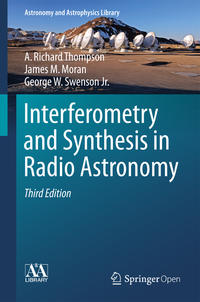
This book is open access under a CC BY-NC 4.0 license.The third edition of this indispensable book in radio interferometry provides extensive updates to the second edition, including results and technical advances from the past decade; discussion of arrays that now span the full range of the radio part of the electromagnetic spectrum observable from the ground, 10 MHz to 1 THz; an analysis of factors that affect array speed; and an expanded discussion of digital signal-processing techniques and of scintillation phenomena and the effects of atmospheric water vapor on image distortion, among many other topics.With its comprehensiveness and detailed exposition of all aspects of the theory and practice of radio interferometry and synthesis imaging, this book has established itself as a standard reference in the field. It begins with an overview of the basic principles of radio astronomy, a short history of the development of radio interferometry, and an elementary discussion of the operation of an interferometer. From this foundation, it delves into the underlying relationships of interferometry, sets forth the coordinate systems and parameters to describe synthesis imaging, and examines configurations of antennas for multielement synthesis arrays. Various aspects of the design and response of receiving systems are discussed, as well as the special requirements of very-long-baseline interferometry (VLBI), image reconstruction, and recent developments in image enhancement techniques and astrometric observations. Also discussed are propagation effects in the media between the source and the observer, and radio interference, factors that limit performance. Related techniques are introduced, including intensity interferometry, optical interferometry, lunar occultations, tracking of satellites in Earth orbit, interferometry for remote Earth sensing, and holographic measurements of antenna surfaces. This book will benefit anyone whois interested in radio interferometry techniques for astronomy, astrometry, geodesy, or electrical engineering.